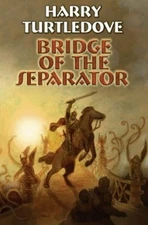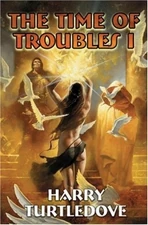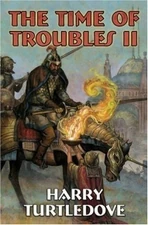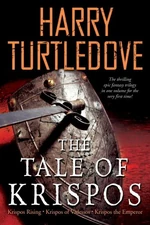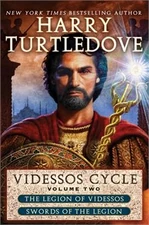TR (Message Wall | contribs) |
No edit summary |
||
| Line 7: | Line 7: | ||
'''Stavrakios''', known as the "Great", reigned a century after the empire was founded (two hundred years before the birth of [[Rhavas]] and 1100 years before the arrival of the [[Roman Legion]]); during his reign, the [[Videssian]]s invaded both [[Makuran]] and [[Halogaland]]. Stavrakios sacked [[Mashiz]] and was said to have defeated [[Rishtaspa]], King of Kings, in single combat. He also conquered [[Agder]]. The Empire grew to its greatest extent under his reign. His rule was also the most stable. |
'''Stavrakios''', known as the "Great", reigned a century after the empire was founded (two hundred years before the birth of [[Rhavas]] and 1100 years before the arrival of the [[Roman Legion]]); during his reign, the [[Videssian]]s invaded both [[Makuran]] and [[Halogaland]]. Stavrakios sacked [[Mashiz]] and was said to have defeated [[Rishtaspa]], King of Kings, in single combat. He also conquered [[Agder]]. The Empire grew to its greatest extent under his reign. His rule was also the most stable. |
||
| − | Later generations who viewed his portraits were of the opinion that, despite his imperial raiment, he looked more like a veteran underofficer than an Emperor.''[[Krispos Rising]]'', pg. 220, mmp; ''[[The Tale of Krispos]]'', p. 204, TPB. |
+ | Later generations who viewed his portraits were of the opinion that, despite his imperial raiment, he looked more like a veteran underofficer than an Emperor. E.g., ''[[Krispos Rising]]'', pg. 220, mmp; ''[[The Tale of Krispos]]'', p. 204, TPB. |
It was during his reign that [[Kveldulf]] was martyred.See, e.g., ''[[Counting Up, Counting Down]]'', pgs. 312-338, TPB. |
It was during his reign that [[Kveldulf]] was martyred.See, e.g., ''[[Counting Up, Counting Down]]'', pgs. 312-338, TPB. |
||
| Line 36: | Line 36: | ||
==Sermeios== |
==Sermeios== |
||
| − | '''Sermeios''', during his reign as Avtokrator, once visited [[Opsikion]] and dined at the estate of a local nobleman. Decades later, this nobleman's grandson [[Mavros]] became [[Sevastos of Videssos]].''[[Krispos Rising]]'', pg. 115, mmp.; ''[[The Tale of Krispos]]'', pg. 108. |
+ | '''Sermeios''', during his reign as Avtokrator, once visited [[Opsikion]] and dined at the estate of a local nobleman. Decades later, this nobleman's grandson [[Mavros]] became [[Sevastos of Videssos]].''[[Krispos Rising]]'', pg. 115, mmp.; ''[[The Tale of Krispos]]'', pg. 108. |
===Literary comment=== |
===Literary comment=== |
||
| Line 89: | Line 89: | ||
===Laskaris=== |
===Laskaris=== |
||
| − | In the [[Legion Cycle]], [[Mizizios]] tells [[Marcus Aemilius Scaurus]] that the Avtokrator '''Laskaris''' sacked [[Mashiz]] 739 years before the arrival of the [[Ronam]]s, taking the helmet from the corpse of [[Rishtaspa]], [[King of Kings of Makuran]], which became a trophy for the [[Empire of Videssos]].<ref>''[[Videssos Cycle: Volume One]]'', pg. 82; ''[[The Misplaced Legion]]'', chapter IV.</ref> In the same scene, Scaurus reflects that Laskaris' portrait looks more like a veteran underofficer than an Emperor, a sentiment repeated in two later volumes of the Cycle.<ref>''[[Videssos Cycle: Volume Two]]'', pgs. 310, 814-815; ''[[The Legion of Videssos]]'', chapter XI; ''[[Swords of the Legion]]'', chapter XIV.</ref> In all other [[Videssos Series]] entries, these descriptions are reassigned to [[Stavrakios], and Laskaris is never mentioned again. Implicitly, Turtledove retconned Laskaris into Stavrakios, deliberately or otherwise. |
+ | In the [[Legion Cycle]], [[Mizizios]] tells [[Marcus Aemilius Scaurus]] that the Avtokrator '''Laskaris''' sacked [[Mashiz]] 739 years before the arrival of the [[Ronam]]s, taking the helmet from the corpse of [[Rishtaspa]], [[King of Kings of Makuran]], which became a trophy for the [[Empire of Videssos]].<ref>''[[Videssos Cycle: Volume One]]'', pg. 82; ''[[The Misplaced Legion]]'', chapter IV.</ref> In the same scene, Scaurus reflects that Laskaris' portrait looks more like a veteran underofficer than an Emperor, a sentiment repeated in two later volumes of the Cycle.<ref>''[[Videssos Cycle: Volume Two]]'', pgs. 310, 814-815; ''[[The Legion of Videssos]]'', chapter XI; ''[[Swords of the Legion]]'', chapter XIV.</ref> In all other [[Videssos Series]] entries, these descriptions are reassigned to [[Stavrakios]], and Laskaris is never mentioned again. Implicitly, Turtledove retconned Laskaris into Stavrakios, deliberately or otherwise. |
===Metokhites II=== |
===Metokhites II=== |
||
Revision as of 09:50, 7 January 2020
The Avtokrator was the absolute ruler of the Empire of Videssos and was considered Phos' vice-regent on Earth. The Avtokrator was assisted by an influential bureaucracy, which was powerful enough to enforce its choice for the throne, even in the face of military opposition. The bureaucracy and military were traditionally rivals for influence over the emperor, and by extension, the empire.
Known Avtokrators
As Harry Turtledove has not revealed every Avtokrator, this list is by no means complete. The list is chronological based on the information available.
Stavrakios
Stavrakios, known as the "Great", reigned a century after the empire was founded (two hundred years before the birth of Rhavas and 1100 years before the arrival of the Roman Legion); during his reign, the Videssians invaded both Makuran and Halogaland. Stavrakios sacked Mashiz and was said to have defeated Rishtaspa, King of Kings, in single combat. He also conquered Agder. The Empire grew to its greatest extent under his reign. His rule was also the most stable.
Later generations who viewed his portraits were of the opinion that, despite his imperial raiment, he looked more like a veteran underofficer than an Emperor. E.g., Krispos Rising, pg. 220, mmp; The Tale of Krispos, p. 204, TPB.
It was during his reign that Kveldulf was martyred.See, e.g., Counting Up, Counting Down, pgs. 312-338, TPB.
Literary comment
Stavrakios' only mentions in the Legion Cycle are a brief reference to his conquest of AgderSee, e.g., Videssos Cycle: Volume One, p. 505; An Emperor for the Legion, chapter VIII. and to the relative harmlessness of the Halogai.See, e.g. Videssos Cycle: Volume Two, p. 149; The Legion of Videssos, chapter VI. The slaying of Rishtapa and the "underofficer" look are attributed instead to Laskaris, who is apparently retconned out of existence in all other Videssos Series entries.
Palamas
Palamas reigned three centuries after the founding of the empire (nine hundred years prior to the arrival of the Ronams.) A plaza in Videssos the city was named in his honor.
Maleinos II
See: Maleinos II
Stylianos
See: Stylianos
Hosios (Likinios' father)
Hosios Avtokrator was the father and immediate predecessor of Likinios.
Likinios
See: Likinios
Genesios
See: Genesios
Maniakes II
See: Maniakes II
Sermeios
Sermeios, during his reign as Avtokrator, once visited Opsikion and dined at the estate of a local nobleman. Decades later, this nobleman's grandson Mavros became Sevastos of Videssos.Krispos Rising, pg. 115, mmp.; The Tale of Krispos, pg. 108.
Literary comment
Based on this timeframe, it is likely that Sermeios was the immediate predecessor of Agarenos.
Agarenos
Agarenos was the father of Rhaptes and Petronas. He reigned before Krispos was born.
Rhaptes
Rhaptes, among other things, ransomed several hundred Videssian peasants from their Kubrati overlords, including a young boy named Krispos.The Tale of Krispos, pg. 23.
He died while his son Anthimos was still very young. Until Anthimos reached his majority, Rhaptes's brother Petronas ruled as Sevastokrator on Anthimos' behalf.Ibid., pgs. 35-36.
Anthimos III
See: Anthimos III
Krispos
See: Krispos
Phostis
See: Phostis
Ioannakis II
Ioannakis II died 300 years before the arrival of the Roman Legion.Videssos Cycle: Volume Two, pg. 436; Swords of the Legion, chapter I.
Khoirosphaktes
Khoirosphaktes reigned roughly 200 years before the arrival of the Ronams. He was remembered for establishing a fort in Pardraya on the Kouphis River as a gift to a powerful Khamorth khagan. It was abandoned after his death. The fort came to be remembered as "Khoirosphaktes' Folly". Khoirosphaktes also sent the khagan an elephant, who promptly returned it.See, e.g., Videssos Cycle: Volume Two, pgs. 150-151.
Rhiasos Akindynos
Rhiasos Akindynos reigned roughly 120 years before the arrival of the Ronams.See Videssos Cycle: Volume One, p. 397; An Emperor for the Legion, chapter III.
Ioannakis III
Ioannakis III reigned for two years, and was the immediate predecessor of Strobilos Sphrantzes. Posterity saw him as a poor fool, and his reign was an unhappy one. His sucessor was no better and also fared badly. Videssos Cycle: Volume Two, pg. 430; Swords of the Legion, chapter I.
Strobilos Sphrantzes
See: Strobilos Sphrantzes
Mavrikos Gavras
See: Mavrikios Gavras
Ortaias Sphrantzes
See: Ortaias Sphrantzes
Thorisin Gavras
See: Thorisin Gavras
Other Avtokrators
Turtledove has named other Avtokrators throughout the series, but has not always provided sufficient information about when they reigned, or the information provided contradicts the rest of the canon.
Gordianos
In Hammer and Anvil, the Avtokrator Gordianos is said to have cheapened his gold currency (by mixing in other metal such as silver and copper) to help restore the Amphitheater of Videssos after an earthquake. The chronology of his reign is unknown.[1]
Laskaris
In the Legion Cycle, Mizizios tells Marcus Aemilius Scaurus that the Avtokrator Laskaris sacked Mashiz 739 years before the arrival of the Ronams, taking the helmet from the corpse of Rishtaspa, King of Kings of Makuran, which became a trophy for the Empire of Videssos.[2] In the same scene, Scaurus reflects that Laskaris' portrait looks more like a veteran underofficer than an Emperor, a sentiment repeated in two later volumes of the Cycle.[3] In all other Videssos Series entries, these descriptions are reassigned to Stavrakios, and Laskaris is never mentioned again. Implicitly, Turtledove retconned Laskaris into Stavrakios, deliberately or otherwise.
Metokhites II
Referenced in passing in Videssos Besieged as the benefactor of the temple to Phos in Amorion.[4]
Rhazates
Rhazates was an Avtokrator who ruled the Empire of Videssos for a very brief period many years before the ascension of Krispos. He was crowned as Avtokrator on the steps of the High Palace, but on being announced to his subjects, the crowd laughed at him because he was grossly overweight. He returned to the palace but was overthrown in a coup d'etat within days.
On being crowned Avtokrator many years later, Krispos remembered reading Rhazates' story in the chronicles with a bit of apprehension before Barsymes introduced him to a similar crowd of onlookers. Krispos understood the incident as a warning that, while Videssos was not a democracy de jure, a would-be Avtokrator, who had not won the popular support of the capital's common population, could never be secure in his emperorship.[5]
Yermanos
In Hammer and Anvil we are told that upon the death of an emperor named Yermanos, the empire fell into civil war.[6]The date of his reign is unknown.
The Fool and the Butcher
The short story "A Difficult Undertaking" is set a few hundred years prior to the arrival of the Misplaced Legion during a period of civil war. Two rivals each claim the throne. Neither is named; Videssian general Kypros Zigabenos calls them "the fool and the butcher". The story doesn't say which claimant, if either, prevailed.
Anthimos I & II, Ioannikis I, Maleinos I, and Metokhites I
From the numerals following various reign names, we can infer that there were three avtokrators by the name of Anthimos, three by the name of Ioannikis, two by the name of Maleinos, and two by the name of Metokhites. We know nothing of the first two Anthimoi, the first Ioannikis, the first Maleinos, or the first Metokhites.
References
- ↑ Hammer and Anvil, mmp, p. 184.
- ↑ Videssos Cycle: Volume One, pg. 82; The Misplaced Legion, chapter IV.
- ↑ Videssos Cycle: Volume Two, pgs. 310, 814-815; The Legion of Videssos, chapter XI; Swords of the Legion, chapter XIV.
- ↑ See, e.g., The Time of Troubles II, p. 641. Videssos Besieged, chapter X.
- ↑ See, e.g., The Tale of Krispos p. 324.
- ↑ Hammer and Anvil, mpp edition, p. 132.
| |||||
| |||||||||||||
